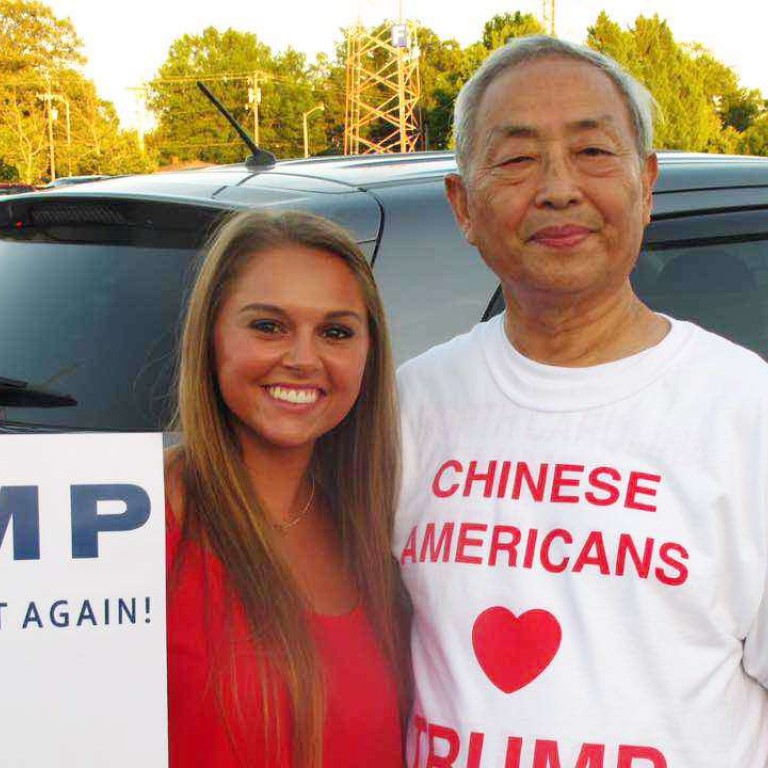
Though small in number, Chinese American voters gain attention in presidential election
Asian Americans in general are fastest growing racial group in the United States
Jack Wang Zhengxian had always voted for the Democratic Party since he emigrated from China to the United States 30 years ago. Today, however, he is an ardent supporter of Donald Trump, the Republican presidential candidate.
As one of 6,000 members of the nationwide campaign “Chinese Americans for Trump”, Wang helped organise state-level events in North Carolina in support of the candidate who, according to a poll, won the hearts of just one in 10 Chinese American voters.
“In the past I did not fully understand why I backed the Democrats,” Wang said. He changed his allegiance after Democrats opposed a state law that banned transsexual people from choosing toilets based on their gender identification.
As the fastest growing racial group in the US according to census data, Asian American voters are gaining media and academic attention in the lead-up to the 2016 presidential election, which will take place on Tuesday.
Despite the relatively small number of Chinese Americans, analysts say all minority groups could potentially serve as a critical mass in a tightly fought race such as the current one between Trump and Hillary Clinton.

This is even more remarkable in North Carolina, a swing state that US analysts call a “make or break” site for Trump and Clinton. Both candidates are scheduled to arrive in the state on Friday to canvass votes, indicating the unusually crucial status the state yields in the race.
Pro-Trump Chinese American supporters have aroused much talk on social media both in the US and in China. On Sunday a plane was hired to fly over North Carolina pulling a banner that read: “NC Chinese Americans For Trump”. Wang likened the mentality of Trump supporters to the reverence showed to Chairman Mao during the Cultural Revolution.
But as far as polling results are concerned, Trump’s failed to take off, scoring only 11 per cent support among Chinese Americans, compared to Clinton’s 52 per cent, according to a poll by National Asian American Survey released in early October. There is no new survey to gauge how the renewed FBI probe on Clinton’s email, which come to light this week, may have affected the preference of American Chinese voters.
“There is no data that I have seen that supports the idea that Chinese American voters are more drawn to Trump,” said Professor Taeku Lee, a political scientist at University of California, Berkeley, who studies Asian American voters and compiled the popularity poll.
While Wang said the Chinese American population in North Carolina was too small to make a difference, Nevada, another swing state, appeared more upbeat, with Asian American community leaders expecting to influence where the six electoral college votes will go.
“Both parties are reaching out to the Asian community now for the first time here in Nevada,” said Marc Matsuo, associate director of the Asian Community Development Council. “I think the Asian population will make a difference in this election.”
Nevada has the fastest growing Asian American population in the US – accounting for 8.3 per cent of the population.
Trump returned to Nevada at the end of October to hold his second rally in the month to shore up support in the state. US Vice-President Joe Biden also held a rally on Saturday to campaign for Clinton.
In the last few weeks leading up to election day, both Clinton and Trump have run full page adverts in Chinese in local newspaper the Las Vegas Chinese Daily News.
“This is a testimonial [of political parties reaching out to Asian Americans] because never before have they paid so much attention to us,” said Gloria T. Caoile, political director of the Asian Pacific American Labour Alliance, which has offices in both Washington DC and Nevada.

“I’m not saying there is not more to be done. But this has been a giant leap,” she said.
The population of Asian Americans grew by almost half between 2000 and 2010, creating up to 600,000 new voters in the last few presidential elections, according to a study conducted by Lee, of UC Berkeley.
“Chinese Americans only make up a small proportion of the total population, so our votes don’t count that much for politicians, and subsequently our interests seem insignificant to them in policymaking,” said Gary Chen, a cardiologist.
Howard Chen, an investment consultant who attended a Trump rally in New York, said the community should unite and participate in politics.
“The older generations of Chinese immigrants are too passive and marginalised, [while] the Chinese American politicians do not necessarily represent common Chinese people,” he said.
Raymond Shen, who is a pro-Clinton operative in North Carolina, said while Chinese Americans had little sway over the presidential election, there is still much to do in lobbying politicians in lower level offices.
“Chinese Americans actively hold fundraisers and forums for candidates” for such offices, Shen said, moments before he attended a fundraiser for Roy Cooper, the Democrat vying to become governor of his state.



